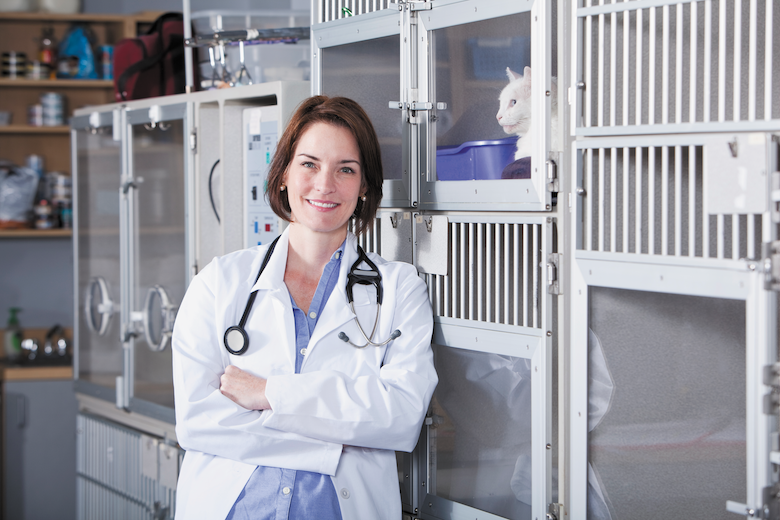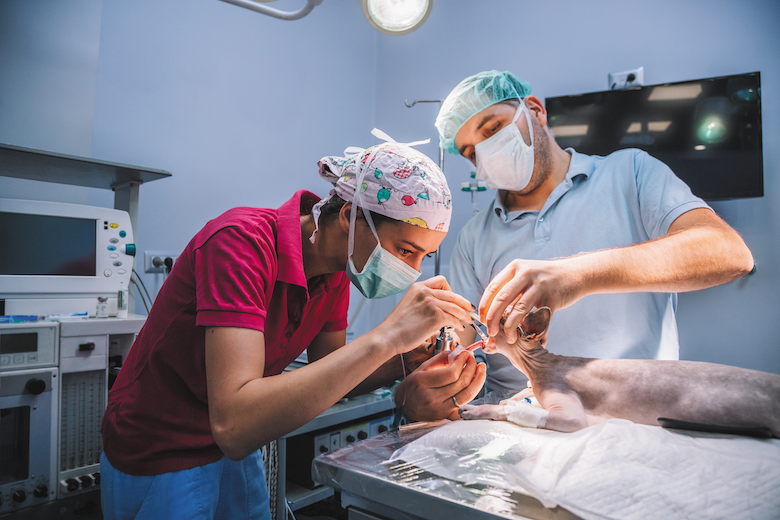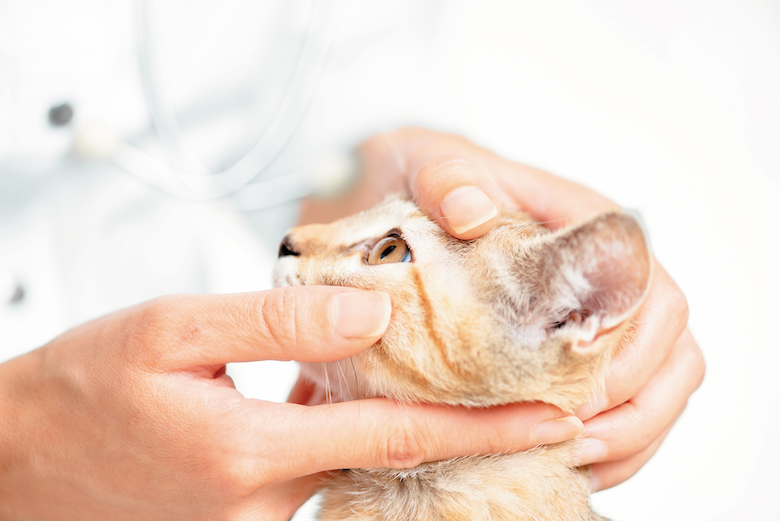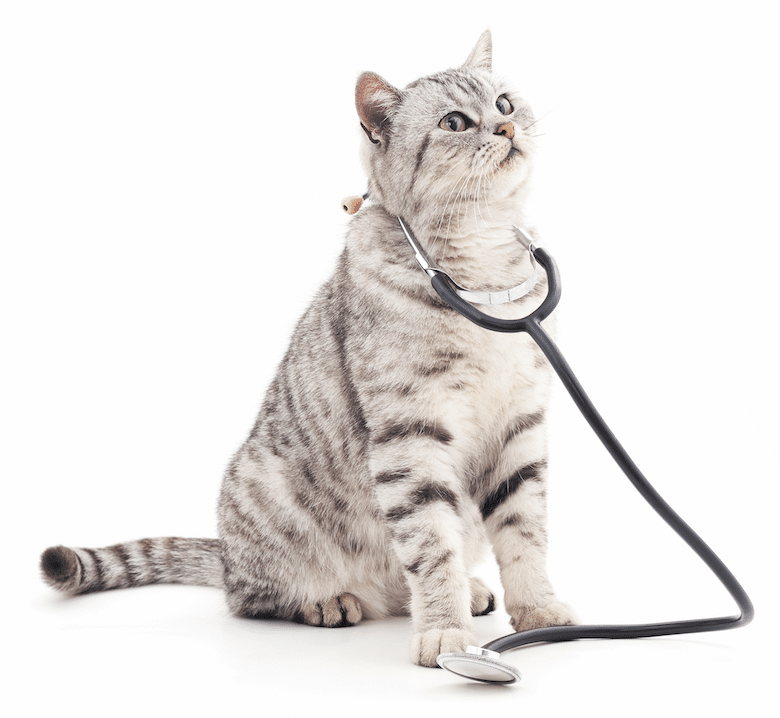What is a Veterinary Specialist? And When Does Your Cat Need to See One?
The post What is a Veterinary Specialist? And When Does Your Cat Need to See One? by Marissa Heflin appeared first on Catster. Copying over entire articles infringes on copyright laws. You may not be aware of it, but all of these articles were assigned, contracted and paid for, so they aren't considered public domain. However, we appreciate that you like the article and would love it if you continued sharing just the first paragraph of an article, then linking out to the rest of the piece on Catster.com.
Just like the human medical field, veterinary medicine has specialties, too. Think about it. We see our primary care doctor for generalized care, but for specific concerns, care or illness, we go to or are referred to a specialist. It’s the same for our feline friends.
“Veterinary medicine is already such a demanding field, with veterinarians required to be able to evaluate and treat all types of animals,” says Michael San Filippo, spokesperson for the American Veterinary Medical Association (AVMA), one of the oldest and largest veterinary medical organizations in the world. “Veterinary specialists provide expertise in specific areas of the field, who can focus their attention on these segments of the profession.
“In addition, there is so much more research and knowledge and technology available across the profession that it’s difficult for one practitioner or one practice to have access to everything that’s available, so specialists ensure pets can receive the care and attention and focus they need in every situation,” he adds.
Veterinary specialists are individuals who have graduated from a veterinary school and then have had several years of advanced training and/or experience in a specialized field of veterinary medicine, such as dentistry, dermatology, internal medicine, ophthalmology and surgery. They must pass a board-certification examination in order to be recognized as a specialist.
On its website, the AVMA says that it, and many state veterinary practice acts, limit the use of the term “specialist” to those veterinarians who have been board-certified by a specialty organization accredited by the AVMA. Currently, there are 22 recognized specialties. Here are some common ones and the corresponding recognized veterinary specialty organization:

Photo: kali9 | Getty Images
Dentistry: American Veterinary Dental College (AVDC)
While many general practice veterinarians provide dental services such as dental cleanings, extractions and intra-oral X-rays, there are times when a specialist may be needed. The AVDC gives the following examples of why: special-needs patients, difficult extractions, multiple extractions, root canals, advanced periodontal disease, oral masses or tumors, stomatitis cases, severe trauma, jaw fractures or orthodontic consultations.
Veterinary dental specialists also have training to provide dental care for patients that general practice veterinarians may not be comfortable placing under anesthesia, AVDC further notes. This could be due to concurrent problems like heart murmurs, kidney disease or cancer.
Dermatology: American College of Veterinary Dermatology (ACVD)
Cat excessively itching? Sometimes clinical signs can be hard to distinguish at first glance. For instance, is the itching caused by a bacterial infection, parasites or some other disease? A veterinary dermatologist has the specialized training to diagnose and treat such conditions. In this case, the veterinarian will interpret the cat’s history and clinical signs and, depending on what’s needed, may perform a cytology test and culture.
In addition to animal skin, veterinary dermatologists have specialized training in the diagnosis and treatment of hair, ears and nails. The vast array of reasons your cat may need a veterinary dermatologist, although by no means exhaustive: skin cancer, infectious skin diseases (bacterial, fungal, viral), atopic dermatitis (environmental allergy), parasitic skin diseases, alopecia, autoimmune skin diseases and congenital skin disease.

Photo: Obradovic | Getty Images
Internal Medicine: American College of Veterinary Internal Medicine (ACVIM)
Veterinarians who specialize in cardiology, neurology or oncology will be board-certified through ACVIM.
Veterinary cardiologists focus on diagnosing and treating heart and lung disease. This may include high blood pressure, pulmonary hypertension, cardiac arrhythmias, coughing and other breathing problems, congestive heart failure or congenital heart defects, to name a few.
If your cat is referred to a veterinary cardiologist, diagnostic testing or treatments may include radiography, echocardiography (sonogram), electrocardiography (ECG), blood pressure evaluation, surgical repair or other means.
Veterinary neurologists study diseases of the brain, spinal cord and other parts of the nervous system. If your cat shows signs of paralysis, seizures, head tilt and balance issues, spinal pain or tremors, a trip to this specialist may be on the short horizon.
The American Cancer Society estimates that there will be more than 1.8 million new human cancer cases in 2020, which means, quite likely, you have experienced or have seen through someone else the toll cancer takes on a living being. It’s not so different in our furry companions.
Veterinary oncologists not only specialize in the way cancer develops and how to treat it, they are trained to help our pets maintain a good quality of life throughout their treatment. As ACVIM puts it: “Our pets deserve and can receive the same caliber of care people receive through the care directed by a veterinary oncologist. However, our pets should also be able to maintain a good quality of life throughout their treatment. In fact, throughout treatment with chemotherapy, radiation therapy and surgery, quality of life is constantly monitored and should be preserved.”

Photo: Remains | Getty Images
Ophthalmology: American College of Veterinary Ophthalmologists (ACVO)
General practice veterinarians are able to manage many eye problems, but there are some that are typically referred to eye specialists, or ophthalmologists. These can include glaucoma, cataracts, retinal diseases, severe injuries and cancer of the eye.The following are possible situations, as outlined by the ACVO, in which your cat may need to see a veterinary ophthalmologist: Your cat’s vision seems to be deteriorating despite treatment efforts, a corneal ulcer has not responded to treatment(s) or your pet’s eye condition has not responded to the recommended therapy. Diabetes can also lead to cataracts, so a consult with a specialist may be needed before the cataracts develop.
Surgery: American College of Veterinary Surgeons (ACVS)
All veterinarians may perform surgery as part of their services, but difficult cases may be best suited to a specialist. Veterinary surgeons can fall into a subgroup, such as orthopedics (bones, joints, ligaments, tendons, etc.) or soft tissue (internal organs and non-bone tissues of the body).
A cat who has endured a fracture due to a car collision or a cat experiencing osteoarthritis — a chronic degenerative disease resulting in changes to the tissues — are two examples in which a veterinary surgeon may be necessary.
Team approach
Don’t think you need to choose a veterinary specialist or journey this road alone. Your general care veterinarian can — and should — support a team approach, keeping connection with both you and the specialist.
“Referrals are not always necessary, but it’s always best to establish a relationship and begin your pet’s care with a veterinarian who can provide general care and advice, and who could recommend a specialist for further care and attention,” Michael says. “It’s also important that your regular veterinarian and your veterinary specialist are communicating and sharing any information that will be helpful to the overall care of your pet.
The post What is a Veterinary Specialist? And When Does Your Cat Need to See One? by Marissa Heflin appeared first on Catster. Copying over entire articles infringes on copyright laws. You may not be aware of it, but all of these articles were assigned, contracted and paid for, so they aren't considered public domain. However, we appreciate that you like the article and would love it if you continued sharing just the first paragraph of an article, then linking out to the rest of the piece on Catster.com.





Post a Comment